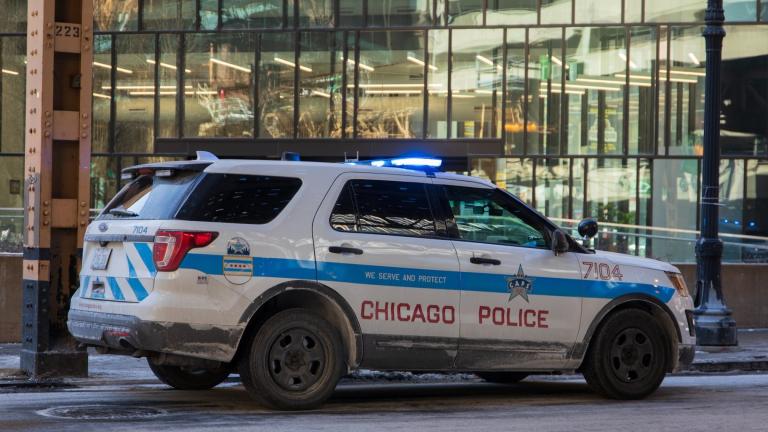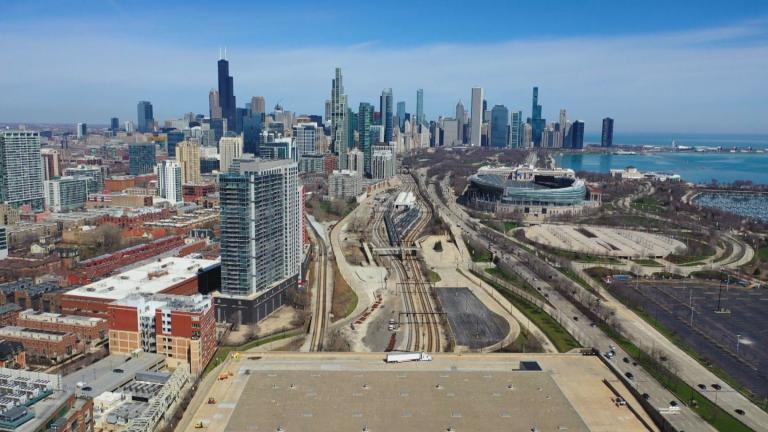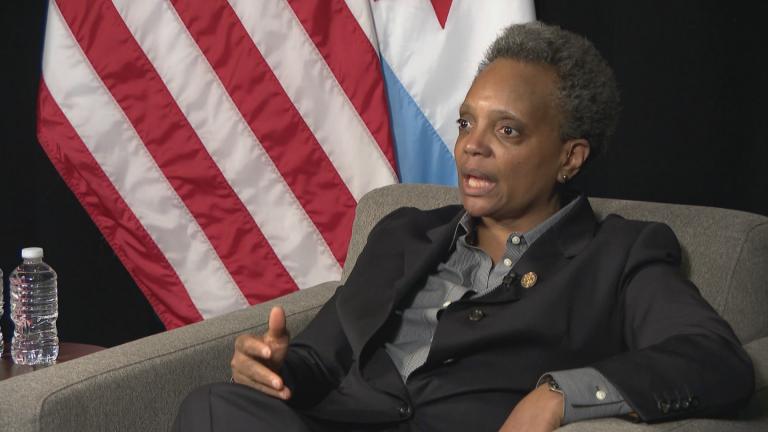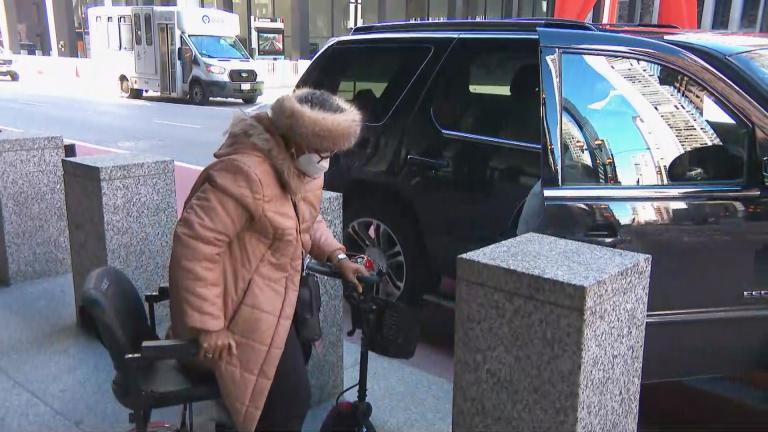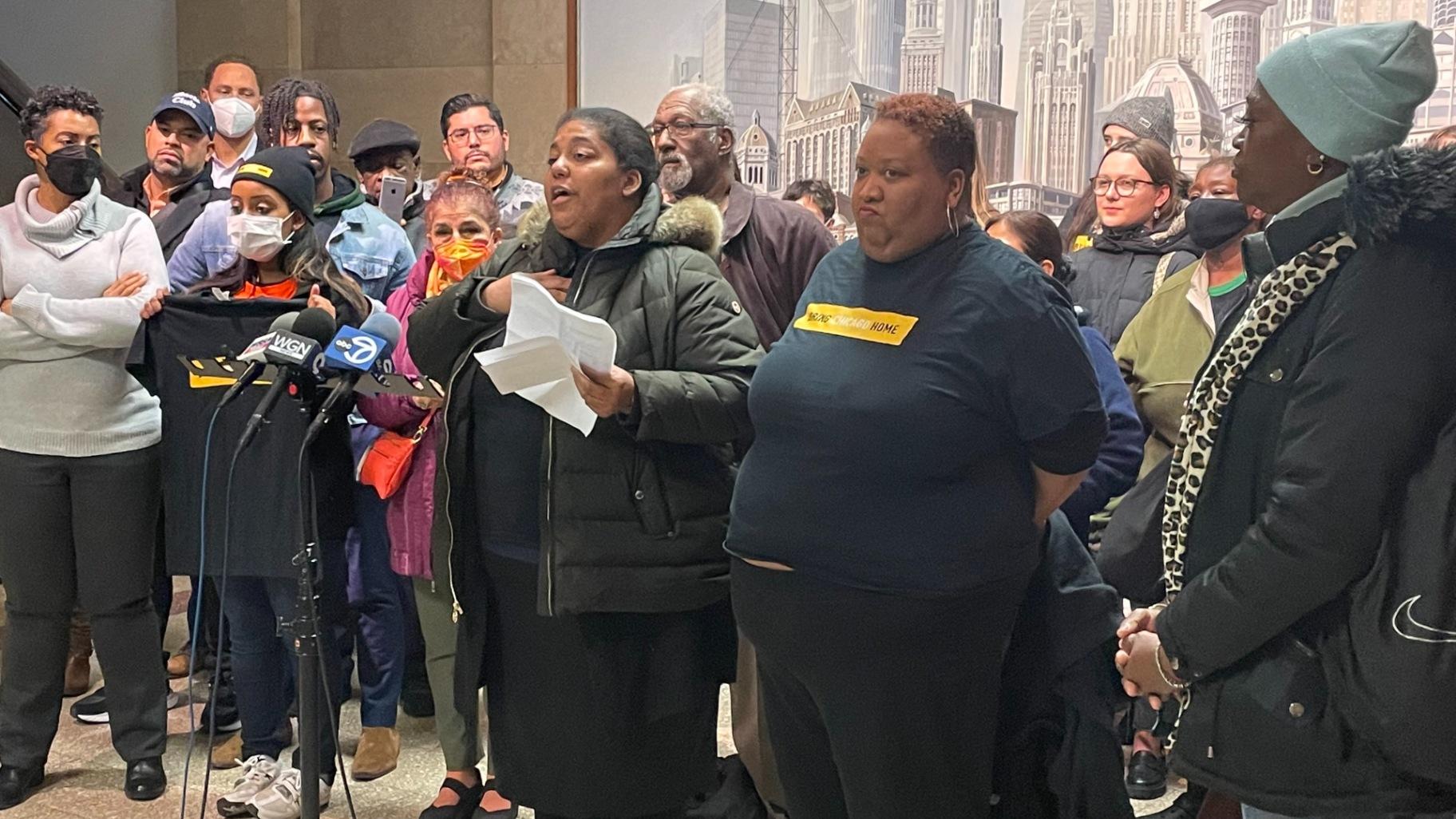 Members of the Chicago Coalition for the Homeless rally in support of the Bring Chicago Home ordinance on Monday, Nov. 14, 2022. (Heather Cherone / WTTW News)
Members of the Chicago Coalition for the Homeless rally in support of the Bring Chicago Home ordinance on Monday, Nov. 14, 2022. (Heather Cherone / WTTW News)
Nearly nine months after former Mayor Lori Lightfoot and her allies on the Chicago City Council blocked a hearing on a proposal to hike taxes on the sales of properties worth $1 million or more to fight homelessness, the proposal known as “Bring Chicago Home” got its moment Thursday in the City Hall spotlight.
Members of the coalition that has been campaigning for the proposal since 2018 finally got their chance to urge the members of the City Council’s Housing and Real Estate Committee to allow Chicago voters to decide the fate of the plan during the 2024 election.
“We should have brought Chicago home a long time ago,” Ald. Jeanette Taylor (20th Ward) said.
Supporters of the proposal say the change will help the nearly 66,000 Chicagoans who are unhoused by generating approximately $160 million annually — enough to address the root causes of homelessness by building new permanent housing that offers wraparound services like substance abuse counseling. That will reduce crime and poverty throughout Chicago, supporters said.
“We have a moral obligation to step up, move forward and make it happen,” Ald. Jessie Fuentes (26th Ward) said.
Backers of Bring Chicago Home had hoped to put the question on the February ballot, when Chicago voters went to the polls to elect a new City Council and mayor. But that push failed to clear its first hurdle, when only 25 City Council members attended a crucial meeting in November — one short of the requirement — in the face of intractable opposition from Lightfoot, who said it would be “spun as a property tax increase.”
That enraged advocates for unhoused Chicagoans.
While candidate Lightfoot backed Bring Chicago Home, less than six months after taking office, she said the proposal was dead, given Chicago’s precarious financial position.
Johnson has left no doubt he is fully committed to implementing Bring Chicago Home, and “building consensus around providing affordable housing to combat homelessness in our city.”
The proposal would not change the real estate transfer tax paid by the buyers of properties worth less than $1 million, keeping the city’s share of the tax at $3.75 for every $500 of the sale price. But when properties sell for $1 million or more, the new owner would pay $13.25 for every $500 of the sale price, according to the proposal.
The measure would not change the share of the transfer tax — $1.50 for every $500 of the sale price — that helps fund the CTA, according to the proposal.
Under the current law, the buyer of a home worth $300,000 pays the same flat transfer tax as the buyer of a multimillion-dollar mansion or downtown skyscraper — a fact that supporters of the change said is unfair.
State law does not give the Chicago City Council the power to change the transfer tax on its own authority. Without legislation passed by the General Assembly and signed by the governor, the measure needs the support of Chicago voters through a referendum before the City Council can levy the tax and collect the funds.
Department of Housing Commissioner Marisa Novara, who will step down at the end of the month, said city officials would recommend the proposal be altered to apply to just to the amount of the sale over $1 million, in an effort to ensure it withstands a legal challenge and lowers the incentive for sellers to “game the system.”
Imposing a marginal tax, rather than a flat tax, would make the tax fairer, and ease the tax burden on two- to six-unit properties, both residential and commercial, Novara said, adding that developments subsidized to be affordable could also be exempted.
For example, a property sold for $1.2 million now pays $9,000 in real estate transfer tax, Novara said. The proposal would hike that to $12,800, an effective increase of about 42% on the $200,000 of the sale price above $1 million, she added.
The funds raised by the tax hike would be kept in a separate fund, and would be required to be used to fight homelessness, advocates said.
Despite the unified and enthusiastic support of Johnson and his progressive allies, advocates for Bring Chicago Home faced pointed questions from more conservative members of the City Council who appeared unconvinced the proposal would be effective in reducing homelessness and could hurt the city’s real estate market.
The City Council will have to vote at least twice to implement the proposal: once to put the proposal on the ballot — either in March or November — and then again to levy the tax, if it is approved by voters.
“I hope we can keep the urgency going,” said Ald. Maria Hadden (49th Ward), the author of the proposal.
Representatives of the Building Owners and Managers Association of Chicago warned alderpeople that hiking the real estate transfer tax could cause the city’s already-struggling commercial real estate market to collapse amid the shift to remote work.
The measure is also opposed by the Chicagoland Apartment Association.
But advocates dismissed those concerns, telling committee members that it would only impact the wealthiest Chicagoans. Just 4.3% of all property sales in Chicago total more than $1 million, which requires annual incomes of between $200,000 and $240,000, advocates said. Just 6% of Chicagoans earn that much money.
Contact Heather Cherone: @HeatherCherone | (773) 569-1863 | [email protected]

